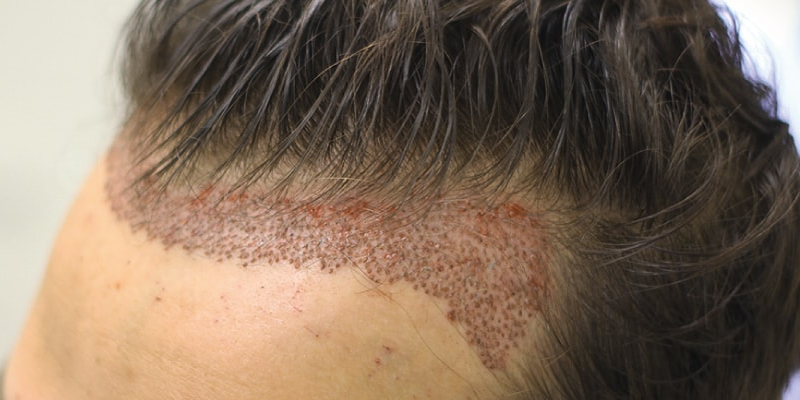Synthetic Hair Transplant
Hair transplants can be done at any age, depending on your medical condition. If you meet the following criteria, you may be a good candidate for an synthetic hair transplant:
- For hair transplant treatments, you have a limited donor area or the donor area has been exhausted.
- You don’t want to get a hair transplant because you will have to wait a few months for the hair to grow back. To put it another way, you want results right away.
- You don’t have sensitive skin or hair, HIV, hepatitis, uncontrolled diabetes, asthma or high blood pressure, and you are not on blood thinners or beta-blockers.
- You are either entirely bald or have extremely low-density hair on your scalp.
What Is The Technique For Hair Transplantation?
A month before the actual implant session, the doctor will conduct a fiber compatibility test. On the bald spot on your head, 100 artificial hairs will be implanted. Allergic reactions will be monitored for nearly a month. If no adverse responses occur, the doctor will advise you to proceed with the surgery in its entirety.
Sebum devices (colorless, the little bumps) may form at the base of the planted hairs, causing infection, inflammation, and even pustules. You must visit the clinic once a month after the synthetic hair transplant procedure to have your scalp cleaned. The following is a list of what a synthetic hair transplant entails:
- The doctor will begin by anesthetizing your scalp with local anesthetic.
- The doctor then inserts the hair strands one by one into the scalp using an automated hair implant equipment. The knot at the end of each strand is inserted and hooked onto the scalp fascia by the hair implant device.
- The doctor will clean your scalp with a disinfectant when the implantation is completed.
Do Artificial Hair Implants Have Any Hazards Or Adverse Effects?
The dangers and drawbacks of artificial hair implant surgery include:
- Because synthetic hair is, at its core, a “foreign body,” your immune cells may reject it outright. Following the surgery, there may be allergic responses.
- Every year, about 30% of synthetic hair falls out, necessitating re-implants to keep the aesthetic appeal.
- Because sebum plugs can form at the root of the hair strands, it is necessary to clean your hair on a regular basis. Infection, irritation, and even cysts can develop if the cleaning is not done properly. For the cleaning, you will need to go to the clinic once a month.
- You will have to resist the urge to scratch if you have a scalp itch. Scratching might dislodge the itch-causing artificial hairs.
- Re-implants on a year-to-year basis can result in a severely damaged scalp.
- For synthetic hair maintenance, you will need to utilize specific shampoos and hair products.
- You should treat your hair with caution right after the treatment since sudden movements can dislodge the newly implanted hair.
- In the long run, there’s a chance that the process will harm the surrounding natural hairs. If the area is fully bald, this is not a danger factor.
- Hair follicles are destroyed by repeated implants, which are gradually replaced by scar tissue, resulting in cicatricial alopecia.
- Reimplants on a regular basis can cause poor blood circulation, which can stop hair from growing and reduce the survival rate of existing hair.
- The day following the surgery, some patients experience a migraine-like headache.
- Cancer is a long-term risk of artificial hair implantation, despite the fact that this has not been proven.
What Are The Advantages Of Implantation Of Synthetic Hair?
our skin will be sensitive and itchy, so try not to scratch it to prevent irritation and infection. In cases such as swelling, tightness, numbness on your face, please do not be afraid and inform your doctor.
Up to 2000 synthetic hairs can be implanted in a single session, depending on the area of baldness. Following a hair implantation surgery, there is no downtime. Following the operation, you can immediately resume your active lifestyle. Because this is synthetic hair, there is no need to wait for the hair to grow. The synthetic hair, in reality, does not grow and stays at the desired length, even if it is clipped. The following are some of the advantages of synthetic hair transplant:
- A painless, quick, and straightforward treatment.
- In a matter of hours, you can achieve a natural aesthetic. Patients notice an instant improvement in their appearance and do not have to wait for their hair to regrow, as with hair transplantation.
- In a few of hours, you will have thicker hair.
- An outpatient surgery that allows you to resume your normal activities immediately following the implant.
- For patients with a limited donor area for hair transplantation, this is an excellent alternative.
- This is a very cost-effective technique.
- It can be used alone or in conjunction with other techniques. It can also be turned off at any point.
Are There Any Pre-Treatment Or Post-Treatment Instructions For Synthetic Hair Transplant?
The doctor will talk to you about your medical history, if any, as part of the pre-treatment routine. A general physical examination and other medical tests will be required of you. The doctor will also prescribe some products that you must use on a regular basis to prepare your scalp for hair implantation. To care for synthetic hair, you will need to utilize specific shampoos and hair treatments.
Gels and hair dyes should not be used after implant as they can damage artificial hair. You should wash your transplant hair regularly with the shampoo recommend by your doctor. You should also thoroughly clean your scalp with a soft brush. Hair products design specifically for synthetic hair must be used, making it easier to comb and style the hair. When washing and combing your hair, be gentle with your scalp so the fake hair does not become dislodged. Following surgery, you must take any drugs and antibiotics as directed by your doctor. Sudden hair movements and scratching should be avoid as much as possible, since they might cause hair to get dislodge. Please, talk to a doctor for a treatment plan and pricing quote that is tailor to your specific requirements.
How will Hair Transplant Turkey News Affect My Opinion About the Procedure?
The hair transplant Turkey news can significantly impact your opinion about the procedure. Many people are now opting for this procedure as it is considered one of the most effective ways to address hair loss. The news that is coming out of Turkey regarding hair transplants is mainly positive and can be very encouraging for those considering undergoing the procedure.

Usually, hair transplant Turkey news highlights the hair transplant success rates of those who have undergone the procedure, providing a detailed look at how it has changed their lives. These stories often show that the patient regained a full head of hair with minimal discomfort and downtime. This helps reassure those considering the procedure that it is safe and effective.

The news about hair transplant Turkey also highlights advancements in hair transplant technology. This can give you an idea of what to expect when undergoing a hair transplant in Turkey and help you make an informed decision about the hair transplantation. By reading up on the latest news and advancements in technology, you can better understand what to expect from the procedure and make an informed decision on whether or not it is right for you.


